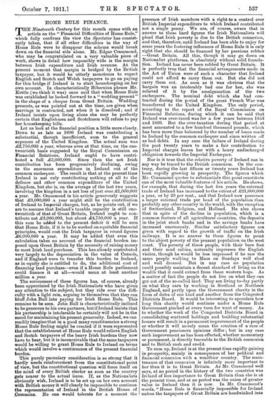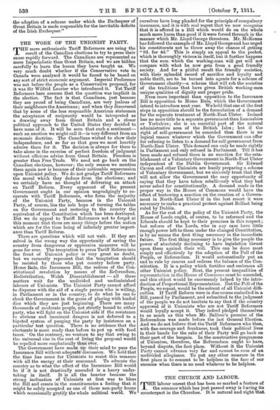HOME RULE FINANCE.
17Nineteenth Century for this month opens with an trticle on the " Financial Difficulties of Home Rule," which fully confirms the view the Spectator has consist- ently taken, that if all other difficulties in the way of Home Rule were to disappear the scheme would break down on the financial side alone. Mr. Edgar Crammond, who may be congratulated on a very valuable piece of work, shows in detail how impossibly wide is the margin between Irish expenditure and Irish revenue. At the present moment that margin is bridged by the British taxpayer, but it would be utterly monstrous to expect English and Scotch and Welsh taxpayers to go on paying for this bridge if Ireland is to start housekeeping on her own account. In characteristically Hibernian phrase Mr. Kettle (we think it was) once said that when Home Rule was established he looked forward to a " wedding present" in the shape of a cheque from Great Britain. Wedding presents, as was pointed out at the time, are given when marriage is contracted, not when it is dissolved ; and if Ireland insists upon living alone she may be perfectly certain that Englishmen and Scotchmen will refuse to pay her housekeeping bills. Let us look at the financial position a little more closely. Down to as late as 1890 Ireland was contributing a substantial, though insufficient, sum to the general expenses of the United Kingdom. The actual sum was .22,750,000 a year, whereas even at that time, on the one- twentieth basis suggested by the Royal Commission on Financial Relations, Ireland ought to have contri- buted a full X3,000,000. Since then the net Irish contribution has been progressively declining, owing to the enormous expenditure in Ireland out of the common exchequer. The result is that at the present time Ireland is not only contributing nothing at all to the defence and other common expenditure of the United Kingdom, but she is, on the average of the last two years, involving the kingdom in a net loss of just over £1,000,000 a year. Mr. Crammond in his article generously suggests that £3,000,000 a year might still be the contribution of Ireland to Imperial charges, but, as he points out, if we are to assume that Ireland's taxable capacity is still one- twentieth of that of Great Britain, Ireland ought to con- tribute not X3,000,000, but about X4,750,000 a year. If this sum be added to the present deficit it will be seen that Home Rule, if it is to be worked on equitable financial principles, would cost the Irish taxpayer in round figures X6,000,000 a year. It may be added that even this calculation takes no account of the financial burden im- posed upon Great Britain by the necessity of raising money to meet Irish land purchase. This has already contributed very largely to the depreciation in the value of Consols, and if England were to transfer this burden to Ireland, as in equity, she is entitled to do, the additional cost of financing land purchase—even if a Home Rule parliament could finance it at all—would mean at least another million a year. The seriousness of these figures has, of course, already been appreciated by the Irish Nationalists who have given any attention to the subject, but they ride over the diffi- culty with a light rein, arguing to themselves that they can bluff John Bull into paying for Irish Home Rule. This remains to be seen. John Bull is characteristically inclined to be generous to his own partners, but if Ireland insists that his partnership is intolerable he certainly will not be in the mood for maintaining his present generosity. Indeed, we can readily imagine that in a good many constituencies a strong Home Rule feeling might be created if it were represented that the establishment of Home Rule would relieve English and Scotch taxpayers of the heavy Irish burdens they now have to bear, but it is inconceivable that the same taxpayers would be willing to grant Home Rule to Ireland on terms which would involve a continuance of the present financial burden.
This purely pecuniary consideration is so strong that it hardly needs reinforcement from the constitutional point of view, but the constitutional question will force itself on the mind of every British elector as soon as the country gets nearer to the actual issue. If, as the Nationalists obviously wish, Ireland is to be set up on her own account with British money it will clearly be impossible to continue the representation of Ireland in the British House of ommons. No one would tolerate for a moment the presence of Irish members with a right to a control over British Imperial expenditure to which Ireland contributed not a single penny. We are, of course, aware that in answer to these hard figures the Irish Nationalists will plead that Irish poverty is due to the British connexion, and that, therefore, until Ireland has been able to enjoy for some years the fostering influences of Home Rule it is only right that she should be financed by her previous robber —Great Britain. All this, though it may go down on Nationalist platforms, is absolutely without solid founda- tion. Ireland has never been robbed by Great Britain. It is perfectly true that the financial arrangements made in the Act of Union were of such a character that Ireland could not afford to carry them out. But she did not carry them out. As soon as it was obvious that the bargain was an intolerably bad one for her, she was relieved of it by the amalgamation of the two exchequers. The nominal debt which she had con- tracted during the period of the great French War was transferred to the United Kingdom. The only period, according to the report of the Royal Commission on Financial Relations, during which it can be said that Ireland was over-taxed was for a few years between 1853 and 1860. But the over-taxation during that period at most amounted to a few hundred thousand pounds, which has been more than balanced by the number of loans made to Ireland by the common exchequer and since written off as bad debts. In any case the failure of Ireland during the past twenty years to make a fair contribution to Imperial charges leaves her with a heavy undischarged obligation towards the Imperial Exchequer.
Nor is it true that the relative poverty of Ireland can in any way be traced to the British connexion. On the con- trary, during the last fifteen or twenty years Ireland has been rapidly growing in prosperity. The figures which Mr. Crammond quotes to substantiate this point constitute one of the most valuable features of his article. He shows, for example, that during the last five years the external trade of Ireland has increased to the extent of £21,000,000 a year, or by 20 per cent., and that Ireland now possesses a larger external trade per head of the population than probably any other country in the world, with the exception of Switzerland, Belgium, and Holland. He also shows that in spite of the decline in population, which is a common feature of all agricultural countries, the deposits in the joint stock banks and in the savings banks have increased enormously. Similar satisfactory figures are given with regard to the growth of traffic on the Irish railways. It is no answer to these figures to point to the abject poverty of the peasant population on the west coast. The poverty of these people, with their bare feet and their mud cabins, naturally impresses the English visitor, though he would be less impressed if he saw the same people walking to Mass on Sundays well shod and well dressed. But in any case no population could possibly maintain a decent standard of living on the wealth that it could extract from these western bogs. As a matter of fact the people do not live on what they can get out of the so-called land. They are living to-day partly on what they earn by working in Scotland or Northern England, and partly upon the Government charity in the form of doles of one kind and another from the Congested Districts Board. It would be interesting to speculate how long this charity would continue under a Home Rule Government pinched at every turn for want of money. As to whether the work of the Congested Districts Board in consolidating scattered holdings and building substantial houses will result in a permanent improvement of the people or whether it will merely mean the creation of a race of Government pensioners opinions differ ; but in any case such improvement as has been effected, whether momentary or permanent, is directly traceable to the British connexion and to British cash and credit.
To sum up, Ireland is at the present time rapidly gaining in prosperity, mainly in consequence of her political and financial connexion with a wealthier country. The main- tenance of that connexion is infinitely more important to her than it is to Great Britain. As Mr. Crammond well save, at no period in the history of the two countries was i Ireland of less importance to Great Britain than she is at the present time, and at no period was the union of greater value to Ireland than it is now. In Mr. Crammond's words, " Home Rule is financially impossible for Ireland unless the taxpayers of Great Britain are hoodwinked into the adoption of a scheme under which the Exchequer of Great Britain is made responsible for the inevitable deficits of the Irish Exchequer."































































 Previous page
Previous page